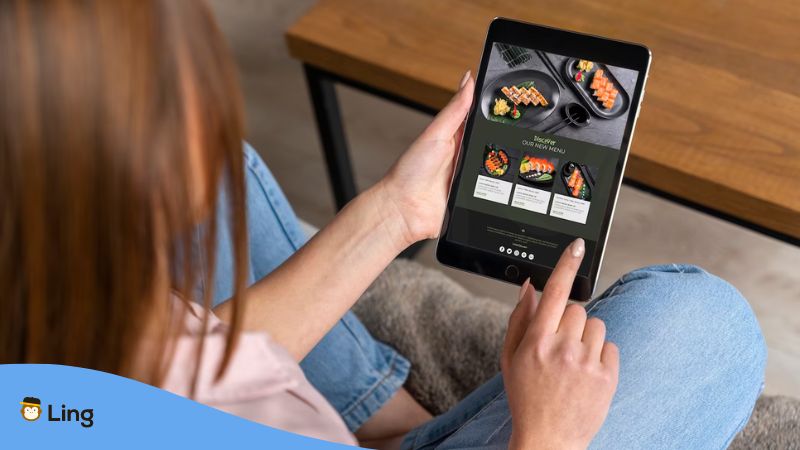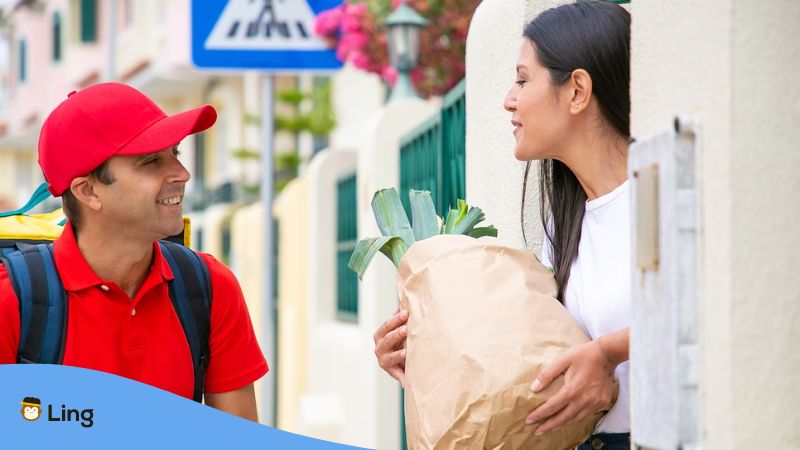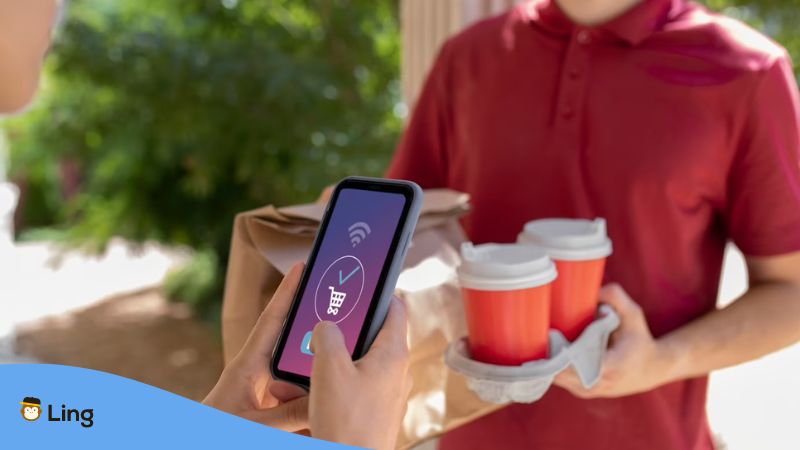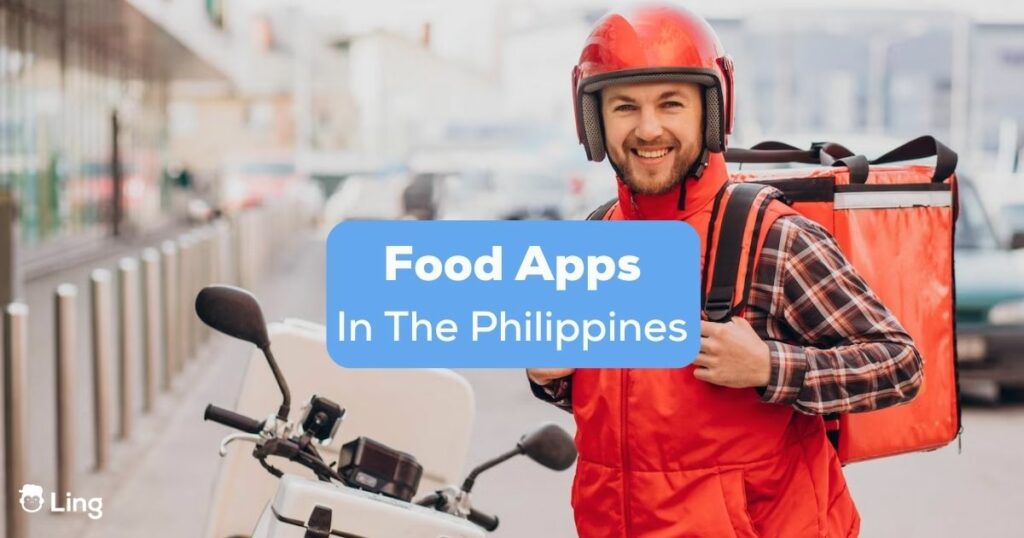Ever notice how technology is reshaping our daily routines? Take ordering food, for example.
We no longer need to wait in line, endure crowded spaces, or even cook – not when we have food delivery apps at our fingertips!
That’s right, we’re talking about those handy apps that bring your favorite meals right to your door.
Gone are the days of waiting in long lines or preparing dishes from scratch. With these apps, you can have your favorite Filipino meals – be it ‘adobo’ or ‘sinigang’ – delivered right to your doorstep!
So, which food apps are making waves in the Philippines? Which ones offer the best deals or boast a roster of your beloved local eateries?
Today, we’ll serve the details on the top food apps in the Philippines while learning Tagalog terms related to food delivery. Ready? Let’s get started!
What Are Food Delivery Apps?
So, what are food delivery apps? They’re digital platforms, or ‘app’ – short for ‘application.’
They connect hungry customers like you and me to a cornucopia of restaurants and food establishments.
These platforms don’t just act as a bridge between customers and eateries. They also offer a ton of features!
These apps are chock-full of perks, from viewing menus and prices to leaving reviews and earning reward points.
Some even allow you to track your order in real-time. Isn’t that nifty?

Philippines’ Top 7 Food Delivery Apps
Let’s get down to brass tacks and explore what makes these food apps stand out. Remember, each one has its unique features and specialties.
1. Food Panda: Your Food Delivery Solution
Food Panda has become a household name, hasn’t it?
Known for its iconic pink logo, this app offers an extensive array of food choices from over 1,000 restaurants.
The best part? It offers city-wide coverage in Metro Manila and other key cities.
Isn’t it amazing to have your favorite food delivered right to your doorstep, rain or shine?
2. GrabFood: More Than Just A Ride-Hailing App
GrabFood, a popular branch of the Grab app, goes beyond ride-hailing.
It’s your personal food courier that delivers from the nearest street food vendor to the biggest brands in the city.
Did we mention the GrabRewards points you can earn with every order? That sounds like a great deal, right?
3. Lalamove: Beyond Logistics
Lalamove might ring a bell for logistics, but did you know they can also bring your food? Yes, you heard it right.
From delivering parcels to sending over your favorite bucket of chicken, Lalamove ensures your orders arrive hot and fresh. Plus, they even cater to multiple ongoing orders!
4. Mangan.ph: Embracing Local Cuisine
Hungry for some local dishes? Mangan.ph focuses on promoting local cuisine from homegrown restaurants.
So whether you’re craving some kare-kare or Bicol express, Mangan.ph could be your best bet for an authentic Filipino food experience.
5. Zomato: Guiding Your Food Journey With Reviews
Zomato is more than just a food delivery app; it’s a food lover’s guide.
With thousands of restaurant reviews, you can explore new dining spots, read about the dishes, and share your food experiences.
It’s like having a gastronomic tour right at your fingertips!
6. Foodee: Exploring Diverse Food Options
Got a particular dish in mind? Foodee offers a diverse selection of food from various cuisines.
Whether it’s Thai, Mexican, Japanese, or the comforting taste of home-cooked Tagalog foods, Foodee brings your cravings to your door.
7. MetroMart: Your Online Grocery Partner
MetroMart has made a name for itself as a reliable online grocery delivery platform.
With partnerships with the biggest supermarket chains and specialty stores, getting your grocery shopping done is as easy as a few taps on your screen.
That’s a convenient way to restock your pantry while you’re chilling at home!

Key Tagalog Terms Used In Food Delivery Services
Now, it’s time to sprinkle in some language learning. And what better way than by understanding the terms used in a food delivery service?
- Food Delivery: In Tagalog, this translates to ‘paghahatid ng pagkain’. If you’re telling a friend about your dinner plans, you could say, “Nag-order ako sa food delivery app para sa ating hapunan,” which means, “I ordered from the food delivery app for our dinner.”
- Order: Interestingly, ‘order’ remains ‘order’ in Tagalog, a testament to the influence of English in everyday Filipino conversation. Here’s a common scenario: “Mag-order ka na ng pizza,” meaning, “Order the pizza now.”
- Delivery Fee: This translates to ‘bayad sa paghahatid’. Here’s how you might use it: “May bayad sa paghahatid ang order natin,” which translates to, “Our order has a delivery fee.”
- Delivery Time: This is referred to as ‘oras ng paghahatid.’ Picture this: “Ang oras ng paghahatid ng pagkain ay 30 minuto,” which translates to, “The delivery time for the food is 30 minutes.”
- Payment Method: In Tagalog, this is known as ‘paraan ng pagbabayad’. You could say, “Ang paraan ng pagbabayad ko ay credit card,” meaning, “My payment method is a credit card.”
- Rider: This is the term for the delivery personnel who bring your order. In Tagalog, they’re often referred to as the ‘Tagahatid.’ For example, “Si Kuya Tagahatid na ang nagdala ng ating order,” means, “The delivery person already brought our order.”
How To Choose A Food App
Choosing food apps in the Philippines is more than just tapping the “install” button. There are a bunch of things to consider.
Let’s break down the key factors, shall we?
Variety Of Food Establishments
First off, let’s talk about variety. It’s like being in a mall food court. The more choices, the merrier!
An excellent food app should provide a wide selection of local restaurants and cuisines.
From your favorite fast-food chains to the local ‘turo-turo’ or canteen-style eateries, having various options can make your food ordering experience more enjoyable.
The question is, how diverse do you want your food choices to be?
Delivery Fees And Minimum Order Requirements
Next, let’s get real about costs. A delivery fee and minimum bill requirement can be a deal-breaker.
Some apps charge a flat rate, while others calculate fees based on distance.
Also, keep an eye out for minimum order requirements. Who wants to order more just to meet a certain amount, right?
So, are you okay with spending a little extra for convenience, or are you after the most affordable deal?
Coverage Area
Let’s not forget about the coverage area. Not all apps operate and deliver food in all regions of the Philippines.
Some may be available in Metro Manila but have limited reach in other provinces.
So, ensure that the app caters to your area.
Payment Options
Lastly, let’s talk about money matters. A good food app should offer various payment options.
From credit and debit cards to cash on delivery (COD), having multiple payment methods can be an absolute convenience.
Also, some apps even offer ‘bayad centers’ (payment centers) for those who prefer to pay in cash.
So, how do you prefer to settle the bill?

The Impact Of Food Apps On Filipino Culture And Language
It’s fascinating how the world changes right before our eyes.
Here in the Philippines, the rise of food delivery apps isn’t just about convenience or trying out new cuisines.
It’s shaping our culture, our dining habits, and even the way we use language.
Who could forget the excitement of ordering food for the first time from a mobile app?
Suddenly, we had access to our favorite restaurants without leaving our homes.
No need to brave the Manila traffic or wait in line, right?
Our dining tables became melting pots of various cuisines – one day it’s American burgers; the next, it’s Chinese dim sum.
These mobile apps have undeniably expanded our palate and transformed the Filipino dining scene.
And with the rise of food delivery apps, we’ve seamlessly incorporated English terms into our vernacular.
Isn’t it common to hear “minimum order” or “cash on delivery” when ordering food?
These terms are now comfortably nestled in our daily conversations, subtly enriching our language use.
More Vocabulary Related To Food Delivery Services
Ready to add some more flavors to your language palate? Why not!
After all, learning is like eating. The more you taste, the more you crave.
And just like that, we’ve simmered up a tasty language stew!
Armed with these terms, you’re now ready to confidently order food online.
Remember, every new word you learn is a spice added to your linguistic pantry.
So, keep adding, keep experimenting, and, most importantly, keep ordering!
Explore Food Apps In The Philippines With Ling!
And that wraps up our flavorful tour of the top food apps in the Philippines!
Isn’t it intriguing how something as everyday as ordering food can open up a world of linguistic discovery?
As we’ve seen, these apps are more than just a means to an end – they’re a bridge connecting us to different cultures and languages, Tagalog included.
But don’t just stop at food apps!
Take your language journey to the next level with the Ling app – your go-to app for learning new languages.
Ling offers interactive lessons, engaging games, and a wide range of resources to help you master Tagalog and 60+ other languages.
It’s more than just a language-learning app; it’s a community of language enthusiasts who are as passionate about learning as you are.
Download the Ling app from Google Play and App Store now!





















